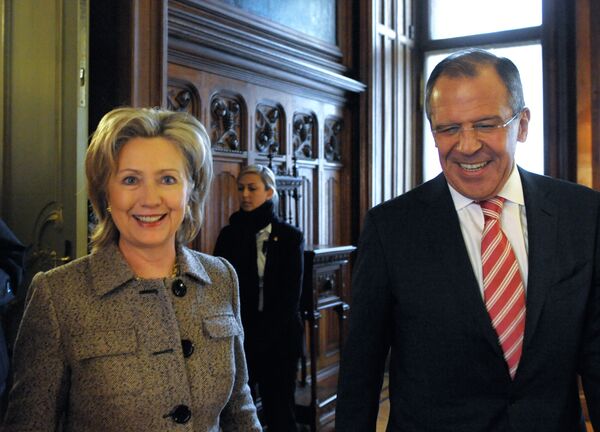On March 19 the Quartet on the Middle East will meet in Moscow. The meeting, held at the at top level, will be hosted by Foreign Minister Sergei Lavrov and will be attended by U.S. Secretary of State Hillary Clinton, UN Secretary-General Ban Ki-moon and High Representative for Foreign Affairs and Security Policy of the European Union Catherine Ashton.
Life in the Middle East has not become any better. Arab teenagers are throwing stones at Israeli soldiers, a third intifada may start any time and the brightest hopes are giving way to disappointment.
Does it make sense for the Quartet to meet at all Even the United States was given a flick on the nose by Israel although the United States was considered the most active and the only influential player in the Middle East which, as it was considered until recently, could exert influence on Israel. But the recent events have disproved this.
Immediately after the United States received the Arab League's agreement to the start of indirect Palestinian-Israeli talks, Israel announced its decision to build 1,600 housing units in East Jerusalem. This decision, announced when U.S. Vice President Joseph Biden was touring the Middle East, made Palestinians and the rest of the Arab world see red.
The press published numerous articles about the unprecedented deterioration in U.S.-Israeli relations. High-ranking officials of both countries hastened to prove the contrary, reassuring the public that the United States and Israel remain best friends and allies. "Israel's one of our closest allies and we and the Israeli people have a special bond that's not going to go away," President Obama said in an interview with Fox News on March 17.
However, both he and Hillary Clinton still consider Israel building houses in East Jerusalem a mistake. On the eve of her arrival in Moscow Clinton said that the United States is alarmed and disappointed by it. This is the most precise assessment of what is happening although it is also possible to say that Washington is thereby admitting its inability to facilitate settlement in the Middle East. It can do no more than other mediators.
The situation in the region is red-hot again. Anything can start a fire again, even the most insignificant excuse. After all, Ariel Sharon's visit to the Temple Mount in 2000 was not such a big deal but it lead to the second intifada and hundreds of victims on both sides, not to mention the change of power in Israel and global re-alignment of forces among the Palestinian political elite.
There have been many such excuses in recent time. Apart from the construction of housing on occupied territories, Palestinians felt insulted by Israel's intention to include holy places in Hebron and Bethlehem into the list of its national heritage, but they are held sacred by the Muslims as well. The opening of the restored synagogue in Jerusalem's Old Town has become one more source of irritation. It appeared to be higher than Muslim mosques. Strange as it may seem, but this is a very serious issue.
A new intifada could have started this week. Fortunately, the Palestinian administration in Ramallah displayed reserve and Israelis did not react too sharply to the Arab teenagers who were throwing stones and Molotov cocktails at them. They did not want to aggravate the Palestinians, the majority of whom are sick and tired of endless clashes and economic despair. They simply want to live but the calls for jihad and intifada are still sounding strong.
A war for shrines, a synagogue taller than a mosque - all these phrases seem to be taken from a textbook on medieval history but who said that anything has changed there since then? Democracy and progress are yet another illusion, and this applies not only to Muslims but also to other communities, including the Jewish one. The way people behave still remains the same.
Thomas Friedman called his column in New York Times "Israel Driving Drunk in the Middle East." His colleague from Haaretz daily compared the Israelis' moves on implementing the roadmap of Middle East settlement with their manner of driving as well -- when they signal a turn to the left, they turn right. But this manner is even more typical of their neighbors in the region. Israelis are at least trying to emulate the "civilized" Europe when enforcing traffic rules, but the emotional Mid-Eastern nature prevails. Demanding that Arabs and Israelis live by the rules of the roadmap drafted outside the Middle East is practically hopeless.
Under the circumstances, the Mid-Eastern mediators can only act as traffic police on busy roads, trying to maintain the status-quo as long as possible and offering the sides ways out of the crisis. It does not depend on the Mid-Eastern mediators whether they will be heeded or not. It only remains for the mediators to quote William Shakespeare: "A Plague on Both Your Houses." But they cannot afford this luxury and have to limit themselves to official statements.
The opinions expressed in this article are the author's and do not necessarily represent those of RIA Novosti.
MOSCOW (Maria Appakova for RIA Novosti)

